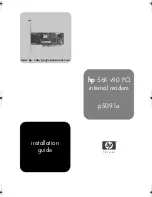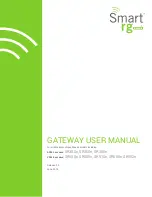
AT Command Set Operation
AT Command Reference Tables
060R122-000
SpectraComm Dual V.34 Modem
4-13
Issue 15
Installation and Operation
Q
n
Response mode
Controls the transmission of result codes.
Q0
Requests non-quiet mode: result codes are transmitted to the DTE as appropriate.
Q1
Requests quiet mode: modem does not send any result codes to the DTE.
Q2
Disables Call Progress Monitor responses in answer mode only. Modem enters this
mode on detection of ring signal.
-Q
n
-Q40
Forces a 1 dB reduction in the signal/noise ratio; incurs nominal processing delay.
-Q41
Forces a 1 dB reduction in the signal/noise ratio; shortens processing delay.
-Q42
Forces a 1 dB reduction in the signal/noise ratio; further shortens processing delay.
-Q
n
commands only take effect in conjuntion with the
&U1
command.
This command is not affected by factory defaults.
%Q
n
Retrain on poor signal
quality
Controls retrain initiation.
%Q0
Disables retrain initiation.
%Q1
Modem will try up to 3 consecutive retrains upon detection of poor signal quality. If
not successful, the modem will disconnect the line.
%Q2
Modem will retrain on poor signal quality until signal quality is OK.
\Q
n
Modem-to-DTE
flow control
Selects the type of data mode flow control used on the DTE port.
\Q0
Disables all flow control.
\Q1
Enables XON/XOFF signaling between modem and DTE.
\Q2
Enables the modem to flow control the DTE via CTS.
\Q3
Operates the same as the \Q2 option, and also allows the DTE to flow control the
modem via RTS as a ready to receive signal.
\Q4
Allows the modem to XON/XOFF the DTE yet ignore these signals when sent by the
DTE (unidirectional flow control).
\Q5
Allows the modem to flow control the DTE by almost stopping the transmit clock
(internal transmit timing must be selected).
Used with synchronous data compression.
\Q6
Allows the modem to flow control the DTE by varying the rate of the transmit clock
(internal transmit timing must be selected).
Used with synchronous data compression.
&R
n
CTS operation
Defines the functionality of the Request to Send and Clear to Send EIA interchange
circuits. V.13 and flow control options override &R settings for CTS
&R0
Causes CTS to follow RTS with an interjected delay specified in S-Register 26 when
in synchronous mode. In asynchronous command mode, CTS will be On. Upon
reaching asynchronous data mode, CTS will follow the applicable ITU-T specification
for the modulation chosen during handshake.
&R1
Causes CTS to follow the applicable ITU-T specification in data mode (in
synchronous modes, CTS will not follow RTS). In command mode, CTS will be On.
&R2
Causes CTS to follow the applicable ITU-T specification. During test modes, CTS will
follow V.54 conventions. CTS does not follow RTS in data modes. CTS will go Off
after the call is dropped.
&R3
Forces CTS On in all modes of operation (RTS is ignored).
Summary of Contents for 060A027-001
Page 137: ......
















































